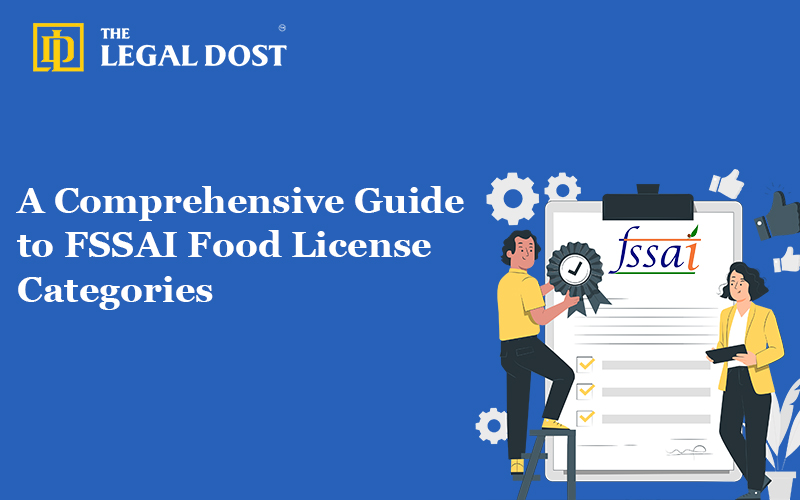In India, food safety is an important part of running any business that deals with food. The Food Safety and Standards Authority of India (FSSAI) makes sure that all food businesses follow the rules, which protects the health of the people. It is important to know about the different FSSAI food license categories if you want to start a food business or already run one. This blog tells you everything you need to know about FSSAI licenses, including the different types and how to get one.
What is a Food License?
In India, the FSSAI controls the food licenses required for all food businesses. It ensures that all food items, whether made, stored, distributed, or sold, meet the safety standards. It also helps people trust the business, since the FSSAI logo on food products is a sign of quality and safety.
Types of FSSAI Licenses
The FSSAI gives out different types of licenses on the basis of the type of food business and how big it is.
FSSAI Basic Registration
This is for small businesses or new companies that make less than 12 lakhs a year. Small food vendors, hawkers, and food services operating out of people’s homes are some examples.
FSSAI State License
Companies that make between ₹12 lakhs as well as ₹20 crores a year need an FSSAI State License. Medium-sized businesses, such as small factories, restaurants, and storage units, fall into this group.
FSSAI Central License
Large companies that make more than 20 crores a year or export food products need the FSSAI Central License. Food chains, importers, and online food businesses can also use this license.
FSSAI Food License Category List
The FSSAI food license category list helps companies figure out what kind of license they need based on how they run their business. The food category list is broken up by the FSSAI into the following sections:
- Prepared food category in FSSAI: Covers cooked food items.
- FSSAI-approved products list: Includes all food products that meet FSSAI standards.
- Proprietary food examples: Foods like chips or chocolates that do not fall under standardized food categories.
Food Categories and License Requirements
Understanding the necessary permissions and the food categories list is crucial. Here are some important groups:
- Fast food license: For quick-service restaurants.
- Restaurant license: Mandatory for dine-in establishments.
- License for food stall: For temporary food setups or stalls.
- Catering license: For catering services at events.
- FSSAI products and proprietary food examples: Include customized food items and innovations.
How to Apply for an FSSAI License?
You need to register on the FSSAI portal, fill out the required information, upload the required papers, and pay the FSSAI food license fees. Here’s what you can do next:
- FSSAI food license apply: You can submit your application on the official website.
- Food license certificate download: You can download the food license from the portal once approved.
- For businesses in Uttar Pradesh, search for FSSAI UP to find specific state guidelines.
Benefits of an FSSAI License
- Ensures food safety and hygiene.
- The FSSAI logo on food products makes people more likely to believe the product.
- Provides legal compliance, avoiding penalties.
- It facilitates the effortless export of FSSAI-approved products.
Food License Fees Across India
Getting a food license has different costs depending on the type of license. For instance:
- Basic registration: ₹100 per year.
- State license: ₹2,000–₹5,000 annually.
- Central license: ₹7,500 annually.
Food license fees in UP may differ slightly based on local regulations. Before applying, always ensure to review the most recent updates.
Importance of FSSAI India
FSSAI makes sure that food businesses keep up with high standards. By following the FSSAI food category list and getting the right licenses, you can follow the rules and gain a competitive edge.
Summary
You need to obtain the appropriate license if you wish to ship FSSAI products, open a restaurant, or operate a food stand. From the FSSAI food category list to the license required for food business in India, it’s important to know what you need to run a legal and successful food business. Start the application process right away to ensure your business runs smoothly under FSSAI India rules.
Put the FSSAI logo on food products and download the food license to demonstrate your trustworthiness to your customers.
A Comprehensive Guide to FSSAI Food License Categories (FAQ’s)
Small food companies must obtain a basic certification known as FSSAI registration to ensure they adhere to food safety regulations.
The FSSAI product list has approved food items that companies can make or sell. It includes both private and standard items.
Your food business type tells FSSAI what kind of license you need: a Basic Registration License, a State License, or a Central License.
The FSSAI category list organizes food items into categories such as prepared foods, drinks, and dairy products.
The food category list FSSAI lists different types of food, which helps businesses figure out what licenses they need to run their businesses.
Yes, an FSSAI license for a restaurant is required to ensure that food safety rules are followed.
The FSSAI code is a unique 14-digit number that food businesses get to show that they follow FSSAI rules.
Based on the size and turnover of the business, the FSSAI license categories are as follows: Basic Registration for small businesses, State License for medium-sized businesses, as well as Central License for large businesses.


